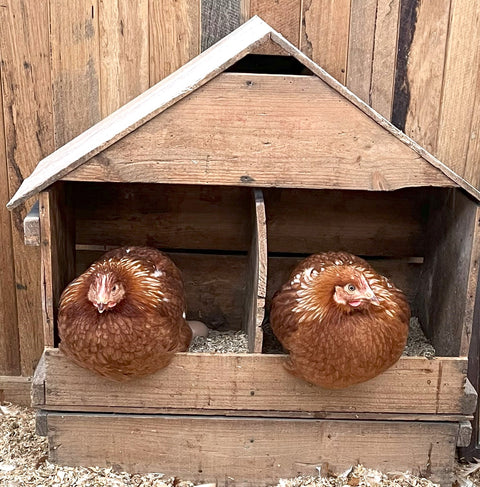If you've got chickens, chances are you've encountered the drama of a broody hen. The nesting box queue grows longer, patience wears thin among your flock and suddenly, you've got a bottleneck in your morning routine. Sound familiar?
Broodiness is a natural part of a hen's life, especially as the warmer months roll in. The rising mercury stirs their hormones and some hens - particularly purebred ones - may succumb to their instincts, deciding it's time to hatch some eggs. But if your eggs are destined for omelettes, not offspring, broodiness can be a challenge.
Now that Talking Hens is establishing our purebred breeding flocks, Spring has tipped a number of our Pekin Bantams, Sussex and Barnevelders into broodiness. It’s not something we saw too much of with our Hy-Line Browns but purebreds are a different kettle of fish. Let's dive into how to recognise, manage and overcome broodiness in your hens so you can restore peace to your coop.
What Does a Broody Hen Look Like?
A broody hen is hard to miss. For starters, she takes over the nest box, both day and night, staking her claim with puffed-up feathers and an attitude to match. Her screeching and defensive pecks warn others to steer clear.
Physically, she'll sit low and wide, sometimes plucking feathers from her breast to expose warm skin - perfect for incubating eggs. You might also spot her unmistakable "broody bombs" - large, round droppings deposited outside the box once a day.
Her behaviour can be frustrating for the rest of the flock. Other hens, desperate to lay, may pace and call out in protest, while the broody hen remains steadfast, refusing to budge.
Why Broodiness Can Be a Problem
Broodiness itself isn't harmful, but it can lead to several issues:
- Health Risks:
- Overheating:
- Egg Production:
If you're relying on your hens for eggs, it's time to intervene.
How to Break a Broody Hen's Cycle
If your broody hen is disrupting the coop or compromising her health, here are some effective strategies to bring her back to her productive self:
- Do Nothing (If You Can Afford To)
Sometimes, it's fine to let nature take its course. If her broodiness isn't causing problems, allow her to sit it out. Ensure she has easy access to food, water and a mite-free nesting environment by refreshing her bedding with a sprinkle of Bugs Away.
However, keep a close eye on her condition, especially during heatwaves. Broodiness typically lasts around 21 days, so patience might solve the problem.
- Remove Her from the Nest
The simplest approach is to remove her from the nest box. Gently lift her out, collect any eggs and place her in the run with the rest of the flock. Encourage her to forage with treats, such as corn or mealworms, to distract her from returning.
You may need to repeat this several times a day, but persistence often pays off.
- Block Access to the Nesting Box
Once the day's eggs are collected, consider closing off the nesting boxes entirely. This prevents her from resettling and breaks the habit. However, some hens might simply find another corner to brood, so keep an eye on her.
- Cool Her Down
Broody hens have elevated body temperatures due to hormonal changes. Reducing this temperature can sometimes halt the broody behaviour.
- Use a Brooding Cage
For stubborn hens, a brooding cage might be the best solution. Use a raised wire-bottom cage without bedding to increase ventilation and cool her underside. Position the cage in the coop to keep her safe and social.
Provide food and water, but no nesting materials. Release her daily to see if the broody behaviour persists. Repeat until she shows no interest in returning to the nest.
Additional Tips to Prevent Broodiness
Why Patience Is Key
Breaking a broody hen's cycle takes time and consistency. While some hens will snap out of it after a day or two, others may require persistent effort. The key is to act quickly to prevent health risks and disruptions to the flock.
By understanding the signs of broodiness and applying these tried-and-tested methods, you can keep your hens happy, healthy and laying eggs once again. And remember - even the broodiest of hens can be brought back into the fold with a little patience and care.
The Broody Hen Dilemma: A Balancing Act
Dealing with a broody hen can feel like a delicate balancing act between respecting natural instincts and maintaining a productive flock. It's important to remember that broodiness is a normal behaviour, deeply ingrained in many chicken breeds. Some chicken keepers even value this trait, especially if they're looking to hatch their own chicks.
However, for those of us who keep chickens as both pets and for their regular eggs, a broody hen can throw a spanner in the works. The key is to approach the situation with empathy and understanding, while also considering the needs of your entire flock and your own goals for backyard chicken keeping.
When Broodiness Becomes Chronic
In some cases, certain hens may become chronically broody, entering this state multiple times throughout the year. This can be particularly challenging and may require more intensive management strategies. If you find yourself dealing with a repeat offender, consider:
- Breed Selection:
- Environmental Adjustments:
- Hormonal Interventions:
Embracing the Silver Lining
While a broody hen can be a nuisance, there's also a potential upside to consider. If you're interested in expanding your flock, a broody hen can be a fantastic natural incubator and mother. Some chicken keepers even "borrow" broody hens from friends to hatch and raise chicks!
If you decide to let your broody hen hatch some eggs, ensure you have a plan for any resulting roosters and that you can accommodate an expanded flock. It's also crucial to provide the broody hen with a safe, quiet area away from the main flock during this time.
The Importance of Observation
Throughout the process of managing a broody hen, close observation is key. Keep an eye out for signs of stress, illness or extreme weight loss. If your hen seems unwell or if her condition deteriorates rapidly, it's time to consult a veterinarian specialising in poultry.
Remember, every hen is an individual with her own personality and quirks. What works for one might not work for another, so be prepared to try different methods and adapt your approach as needed.
Patience, Persistence and Poultry
Dealing with a broody hen is just one of the many adventures that come with keeping chickens. It's a reminder of the complex behaviours and instincts that our chooks possess, even after centuries of domestication.
With patience, persistence and a willingness to try different approaches, you can successfully manage broodiness in your flock. Whether you choose to break the broody cycle or embrace it for hatching, the key is to prioritise the health and well-being of your hens.
So, the next time you find yourself face-to-face with a puffed-up, grumpy hen refusing to budge from her nest, take a deep breath. Remember, this too shall pass - and you're now armed with the knowledge to handle it like a pro.







Comments (3)
I once had a broody Australorpe that melted many ice cubes in her nest without budging from the soggy nest (quite funny!). I had to separate her in a grassy area with nowhere to make a nest to break the broodiness. I have found that some hens get broody in the first year but less so each subsequent year and they grow out of it.
Thanks so much Jason and team for this great article. My Wyandotte has been very broody in September then again in October. Very stubborn girl, this lasted 10 days in Sept then another 9 days in Oct til she snapped out of it. A great battle of wills indeed ! Thanks for the good advice. I tried the frozen bottle method, she continued to sit on these for 20 mins til I removed them, they were thawing out. Very stubborn. Cheers, Sophie
Thank you, very timely and informative. I’m on my 3rd broody hen this spring. One I put day olds under, one I broke in a couple of days and one is a work in progress. Certainly puts disruption in the henhouse! Nice to have some reassurance. 🧐